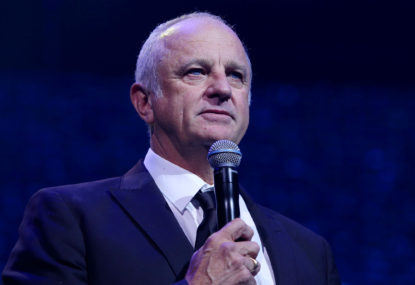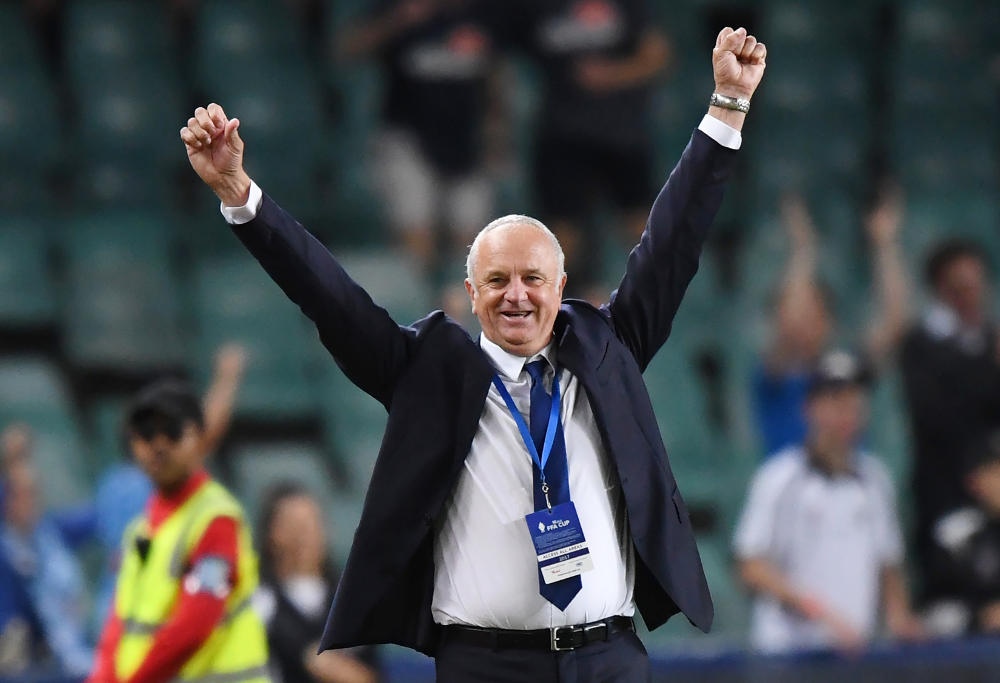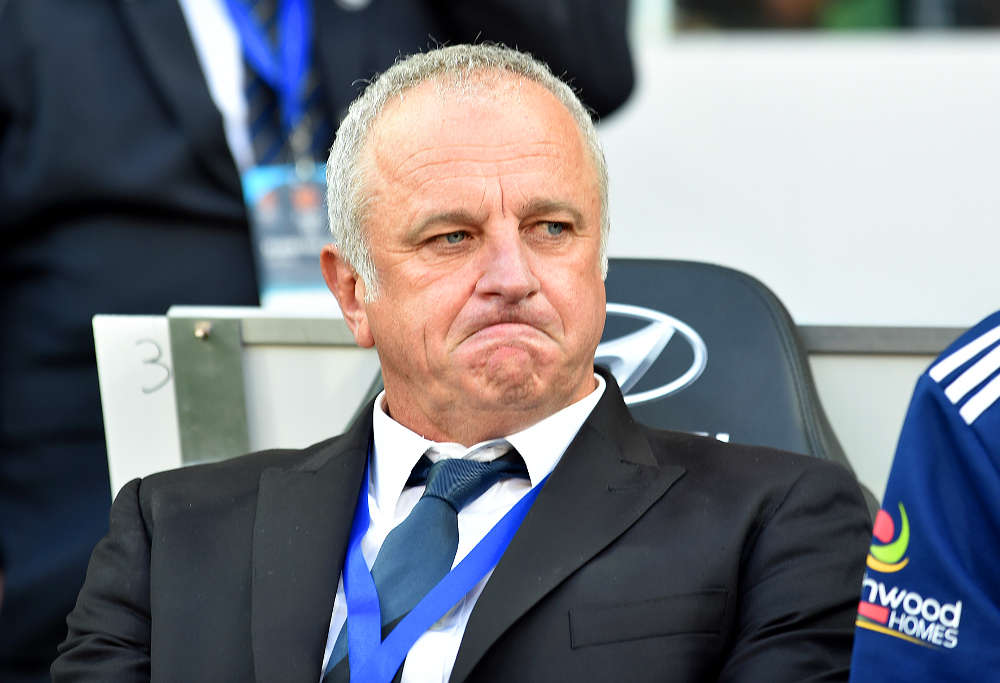Young excellence, promotion battles, and a happy farewell: The Australian team of the week from players around the globe
Even though St.Pauli ultimately lost a high-scoring affair, Jackson Irvine was a standout, as well as scoring a late goal.

“It’s a special day for myself” said Graham Arnold, opening his first media conference as Socceroos manager.
Ah, yes, the classic sportsperson’s misuse of the reflexive pronoun “myself”, when “me” would surely have done; the sort of formal detachment this phrase broadcasts, as if the speaker is narrating his own life while actually living it, set a tone that carried through the fairly measured 20-minute presser.
Arnold introduced his coaching team, including rattling off the extremely impressive-sounding resume of the newly acquired René Meulensteen, former Manchester United assistant coach, a man responsible, we were told, for developing Cristiano Ronaldo.
Assistant coach Andrew Clarke and analyst Doug Kors, both former members of Arnold’s Sydney FC staff, were also mentioned, as was Phil Coles, former physio and performance manager for the NBA’s San Antonio Spurs, who has joined Arnold’s team as coordinator of physiotherapy.
Arnold then announced that he and his team would, in addition to taking control of the Roos, also take control of the Olyroos, the U23 national team, and will guide them through Olympic qualifying.
Arnold said he’d called “at least ten” of the 2006 golden generation of players, seeking to find out what stage of their careers they thought was the most crucial developmental pivot point, to which, Arnold said, most of them pointing to the period from the U-20 until U-23 stages.
Arnold then pointed out that by the time Brett Emerton was 23, he’d played in 76 internationals across the various age brackets, and that of this year’s squad, when they were 23, Matt Leckie was the leading cap-earner at 41; this was described by Arnold as having “looked at stats”.
As fairly arbitrary as this comparison is – Emerton was an extremely prolific youth international, playing at least 11 games for Australia at U17, U20 and U23 level, whereas Leckie, like most other current senior Roos, was not – there is nonetheless undeniable wisdom in drawing together the youth and senior sections of the national set-up.
Whether that means, as Arnold evidently thinks, having both sides controlled by one manager, or simply a need for a more strongly codified, implemented national approach, the details of the point can be debated, but not the point itself.

(AAP Image/David Moir)
Arnold then placed himself in the Goldilocks medium that’s just right, between, as he said, the more defensive-minded Bert van Marwijk and the more attack-minded Ange Postecoglou.
His words were a wash of coaching buzz-terminology; “when to defend, how to press … how to get our key players on the ball, how to get the ball in goal-scoring areas…”. These were his principles, but he also emphasised that he’s “a winning coach”.
There was hint of the Arnold bristle with those words of winning, and in truth if Postecoglou’s remarkable success with Brisbane Roar formed the most compelling part of his case to be Socceroos manager, then Arnold’s work at Sydney FC – less aesthetic an argument, sure – is just as compelling.
The last two years of success he’s had as Sky Blues manager is rivalled only by Postecoglou’s Brisbane run.
Of course, one of the hallmarks of his Sydney team was an ability to score well-timed goals, that would often end up making the crucial narrow difference in tight games.
He had Golden Boot Bobo; he does not have a striker as potent among the national team pool, and as he confirmed that Tim Cahill would be given a farewell testimonial international later this year, that reality was further cemented.
“Football’s not about one person,” Arnold said, talking about Cahill. “The way that we’ve played, it was very heavily reliant on Timmy to score those goals,” Arnold said.
“I will do that differently,” he added, a point rather more convincingly reinforced by Cahill’s retirement than it was any tactical reasoning given here.
But Arnold certainly was emphatic on the problem of goal-shyness; “That will not be an issue here.”
Arnold was then adamant that, among the youth ranks, he could see a conveyor belt of talent creeping towards the senior team, ready to solve the goal-dearth the Roos suffered in Russia.
One wonders, looking down the list of recent U23 call-ups – Jashua Sotirio, Bruce Kamau, George Blackwood, and others – if Arnold’s looking at the same set of players.
“The kids are coming, they’re coming through. We have to believe it,” Arnold argued. “And I can see it,” he added.
A journalist tried to coax out some more tactical specifics, asking Arnold to elaborate further on something he’d mentioned but in more technical terms.
He’d said that the team should play in “the Australian way”, by which Arnold meant playing bravely, with belief, with spirit, and other slightly lame, emotive locutions more appropriately seen being cannoned out of the flapping gob of some motivational speaker bouncing like a maniac on a mini-tramp than out of the mouth of a man charged with arranging a football team to defend the Asian Cup.
“Be brave to play, to have no fea-…” Arnold began to say again, before the journalist reemphasised a translation of terms he’d asked for.
“Technically, as I said, you know… if you look at the France team, and if you look at the other teams, technically we have the quality,” Arnold said. “I do believe that.”
He spoke of the promise he’s seen at U17 level. He mentioned Mooy, Rogic and Arzani, all as adept attackers capable of delivering the ball to goal-scorers in the #RightAreas. He said the discipline and commitment for which the team had been praised at the World Cup was “the least I expect.”
Arnold was also at pains to state how different a coach he is now from the man that failed so badly in his first crack at national team management.
“I see some of those guys that I coached [back then], and I’m actually embarrassed to say that I coached them!” Arnold chortled.
While the overstatement here felt tactical, a partition deliberately slid across to obscure the ugly past, there is no reason we should expect Arnold not to have learnt from the many mistakes he made ten years ago.

(AAP Image/Joe Castro)
Some wally asked Arnold about Bolt: “Everyone says I need a goalscorer, and Usain hasn’t been capped by Jamaica, so that might be a possibility. That was a joke!” Arnold quipped, almost drowned out by the thunderous ripping sound heard as sides split across the country.
And tactically? “For me, it’s about being flexible,” Arnold replied lightly. “Some games you may need to play a back-three, and some games you play a back four. The most important thing is that principles are kept the same.”
Then the pertinent quote of the afternoon; “We can sit here and talk about systems; systems don’t make players, players make systems,” Arnold declared, a statement that ran in through the ears and bounced around the foggy images of Matt Leckie playing as a wing-back, or Bailey Wright facing down a winger one-on-one that are still kept in the mind. Pragmatism was always likely to be an arrow in Arnold’s quiver.
There were a few compliments for his predecessors, he dodged a question about the FFA congress crisis, and then the occasion wrapped.
Nothing much was given away, not that we should have expected too much meat in his first presser as manager.
Twitter is already throwing up vibrating Technicolor projections of what’s to come, of future calamities or glories.
Arnold now has control over the top two levels of national team, and so it’s to his wagon we’re now hitched, for better or worse.